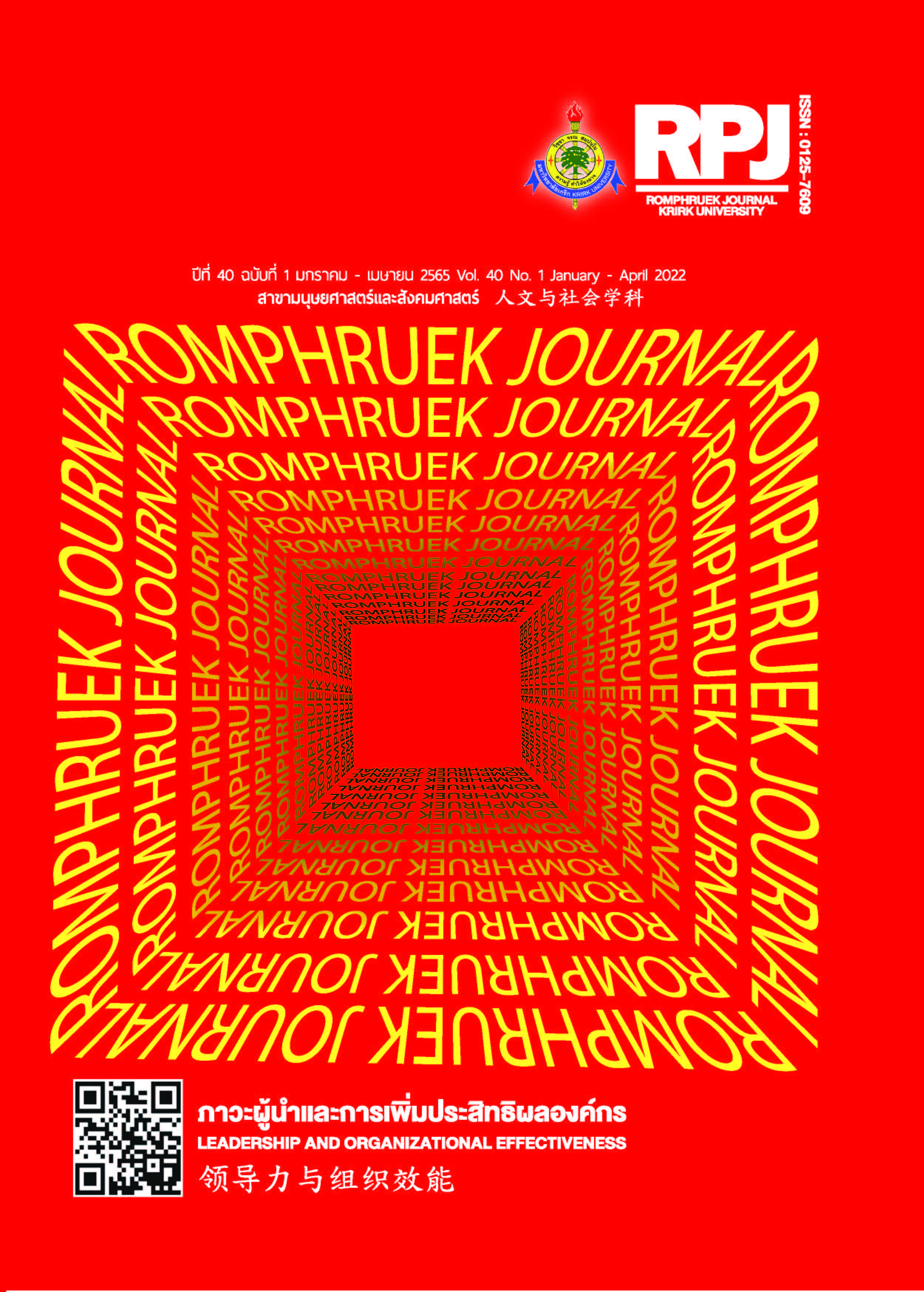Transformational Leadership and Organizational Effectiveness : The Moderating Effect of Organizational Climate
Main Article Content
Abstract
The main purpose of this study was to examine the moderating effects of organizational climate on the relationship between transformational leadership and organizational effectiveness of the divisions within district offices, Bangkok Metropolitan Administration. Units of analysis were the divisions within district offices, Bangkok Metropolitan Administration, and then the population of this study covered approximately 500 divisions. The cluster sampling technique had been conducted. The samples were 232 divisions consisted of 895 in level of individual respondents. The correlational research design and the cross-sectional study were employed. The PLS-SEM and multiple regression techniques were applied. The research results indicated that all dimensions of organizational climate had the significantly positive moderating effects on the relationship between transformational leadership and organizational effectiveness.
Article Details

This work is licensed under a Creative Commons Attribution-NonCommercial-NoDerivatives 4.0 International License.
Every article published in the Romphruek Journal of the Humanities and Social Sciences is the opinion and point of view of the authors. Thery're not the viewpoint of Krirk University or the editored department. Any part or all of the articles for pablication must be clearly cited.
References
พงษ์เทพ จันทสุวรรณ. (2553). ประสิทธิผลองค์การ : ปฏิบทแห่งมโนทัศน์. วารสารร่มพฤษ์, 28(3), 133-182.
พงษ์เทพ จันทสุวรรณ. (2554). ภาวะผู้นำ วัฒนธรรมองค์การกับประสิทธิผลองค์การของโรงเรียนในสังกัดกรุงเทพมหานคร : ตัวแบบสมการโครงสร้าง. ปริญญาดุษฎีบัณฑิต สถาบันบัณฑิตพัฒนบริหารศาสตร์, กรุงเทพฯ.
พงษ์เทพ จันทสุวรรณ เอกรัตน์ ดวงปัญญา ชาญณรงค์ เศวตาภรณ์ และ อนงนาฏ ภูมิภักดี. (2555). ภาวะผู้นำการเปลี่ยนแปลง วัฒนธรรมองค์การ องค์การแห่งการเรียนรู้ และประสิทธิผลของหน่วยงานในสถานีตำรวจนครบาล : การวิเคราะห์เส้นทาง. วารสารร่มพฤษ์, 30(1), 90-116.
ภัครดา เกิดประทุม (2563). อิทธิพลของภาวะผู้นำการเปลี่ยนแปลง บรรยากาศองค์การและพฤติกรรมการเป็นสมาชิกที่ดีขององค์การที่ส่งผลต่อประสิทธิผลการดำเนินงานของสำนักงานเขตกรุงเทพมหานคร. บัณฑิตวิทยาลัย มหาวิทยาลัยเวสเทิร์น, ปทุมธานี.
Addai, P., Avor, J., Ofori, I.N. & Tweneboah, D.N. (2019). Ethical leadership and productive work attitudes among micro financial institutions in Ghana : Moderating role of organizational climate. Management Research Review, 42(9), 1049-1061.
Afsar, B. & Umrani, W.A. (2020). Transformational leadership and innovative work behavior : The role of motivation to learn, task complexity and innovation climate. European Journal of Innovation Management, 23(3), 402-428.
Bass, B. M. (1985). Leadership and performance beyond expectations. New York : Free Press.
Bass, B. M. & Avolio, B. J. (1997). Full range leadership development : Manual for the multifactor leadership questionnaire. Palo Alto, CA : Mind Garden.
Cameron, K. S. (1981). The enigma of organizational effectiveness. In D. Baugher (Ed). San Francisco : Jossey-Bass.
Cohen, J. (1988). Statistical power analysis for the behavioral sciences. Hillsdale, NJ : Erlbaum.
Dartey-Baah, K. & Agbozo, R.K. (2021). Does organisational politics affect leaders’ ability to engage Ghanaian Bankers?. Industrial and Commercial Training, 53(3), 217-236.
Ekvall, G. (1996). Organizational climate for creativity and innovation. European Journal of Work
and Organizational Psychology, 5(1), 105-123.
Kalliath, T. J.; Buledorn, A. C. & Gillespie, D. A. (1999). A confirmatory factor analysis of the competing values instrument. Educational and Psychological Measurement, 59(1), 143-158.
Kenny, D.A. (2018). Moderation. (November 16, 2020) Retrieved from
http://davidakenny.net/cm/moderation.htm.
Khalili, A. (2016). Linking transformational leadership, creativity, innovation, and innovation-supportive climate. Management Decision, 54(9), 2277-2293.
Kimberly, J. R. (1979). Issues in the creation of organizations : Initiation, innovation, and institutionalization. Academy of Management Journal, 22(3), 437-457.
Kock, N. (2020). WarpPLS 7.0 User Manual. Laredo, TX : ScriptWarp Systems.
Koys, D.J. & DeCotiis, T.A. (1991). Inductive measures of psychological climate. Human Relations,
(3), 265–285.
Litwin, G.H. & Stringer, R. (1968). Motivation and organization climate. Boston : Harvard University Press.
Mathew, J., & Selvi, U. (2007). Importance of organisational climate in contemporary management.
Ushus Journal of Business Management, 6(2), 61-74.
Northouse, P. G. (2015). Leadership : Theory and practice (7th ed.). Thousand Oaks, CA : Sage.
Quinn, R. E. & Rohrbaugh, J. (1983). A spatial model of effectiveness criteria : Towards a
competing values approach to organizational analysis. Management Science, 29(3), 363-
Robbins, S. P. (1990). Organization theory : Structure, design, and applications (3rd ed.). Englewood Cliffs, N.J : Prentice-Hall.
Robbins, S. P. (2005). Organizational behavior (11th ed.). Upper Saddle River, N.J : Pearson.
Sanda, A. & Arthur, N.A.D. (2017). Relational impact of authentic and transactional leadership styles on employee creativity : The role of work-related flow and climate for innovation. African Journal of Economic and Management Studies, 8(3), 274-295.
Stringer, R. (2002). Leadership and organizational climate. Upper Saddle River, NJ : Prentice Hall.


